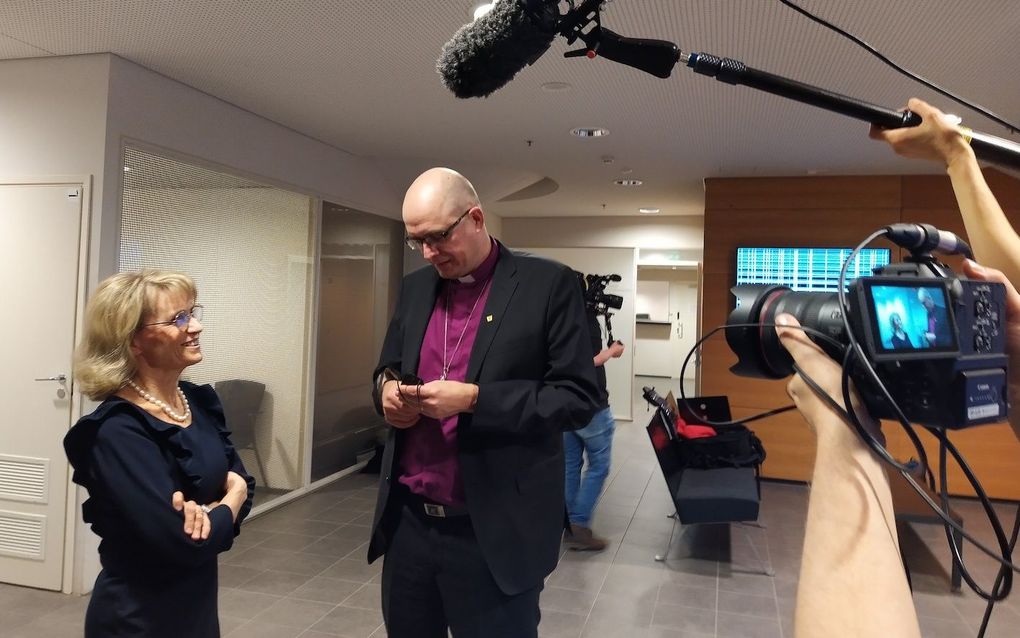Räsänen awaits verdict: what is this case all about?

Räsänen (left) with bishop Pohjola in court, last January. Photo Danielle Miettinen, CNE.news
Northern Europe
The Finnish judge will announce his verdict on Päivi Räsänen next Wednesday. People will be watching the trial all over Europe since it is an important court case for the Christian witness in society.
What is this verdict about?
It is about Mrs Päivi Räsänen, who has expressed her opinion on the Biblical teaching about (homo)sexuality. In her vision, the Bible preserves sexuality for a marriage of a man and a woman. She rejects homosexual activity as being equal to this.
During Pride Week in June 2019, she tweeted, asking the Evangelical Lutheran Church in Finland whether the sponsorship for the Pride Week was proper. “How can the Church’s doctrinal foundation, the Bible, be compatible with elevating sin and shame as reasons for pride?” she asked. Räsänen included a photo of Romans 1,24-27 in the Finnish Bible.
It led to the first accusation of her by the prosecutor, Maija Päivinen: insulting “homosexuals as a group”. According to the prosecutor, Räsänen sees gays as “inferior to other people.”
The second accusation is connected to this: in December 2019, Mrs Räsänen was interviewed during a satirical radio show called “What did Jesus think about gay people?” She was invited for this since she is a well-known figure in Finland, being the former leader of the Christian Democratic group in the parliament and a former Home Affairs minister.
During this broadcast, Räsänen was questioned about (traditional) marriage and sexuality. She stated that it was “absolutely self-evident that God did not originally create humans as homosexuals.” “He created a man and a woman and meant them to be married to each other. And it is clearly against God’s will and sin if you have other types of sexual relations.”
According to the prosecutor, Mrs Räsänen said in this program that “God did not create homosexuals like heterosexuals”, which is “derogatory”. During the hearing in court in January and February 2022, Räsänen and her legal team denied strongly that she had said that.
The third accusation goes a bit further back in history. In 2004, as a medical doctor, Mrs Räsänen wrote a Finnish brochure for the Luther Foundation titled “Male and female He created them”. In this, she stated that homosexuality is a “developmental disorder”. She denies that same-sex attraction is a normal and healthy variation of sexuality. On the contrary, it leads more to casual sexual encounters than to stable relationships. If homosexuality is normalised in society, it makes young people in particular vulnerable since it will be easier for adult men to get in sexual contact with underage boys.

The prosecutor finds all this insulting and discriminatory. Räsänen’s booklet “infringes on the equality and dignity of homosexuals, and they are likely to fuel intolerance, contempt and even hatred toward homosexuals”, the prosecutor writes in her indictment. “Such statements insulting homosexuals are discriminatory and thus overstep the boundaries of freedom of speech and religion.”
Although this booklet was offered freely, it never became a well-known publication. It might have been forgotten if the prosecutor had not heard about it and decided to start an inquiry after it.
Räsänen denies any hatred against homosexuals. In February, she said in court: “My motive is love because my opinion comes up from the loving Word of God.” Her defendants have said that it is the end of the Christian faith if you can’t speak about “shame and sin” anymore.
Mrs Räsänen appeared in court with a Lutheran bishop. What is his role in this?
Bishop Juhana Pohjola is the director of the Luther Foundation that published the brochure and that way connected to the case.
What could be the consequences of the Räsänen case?
Directly, the fines are not very high. But if the judge says that Mrs Räsänen was not allowed to write and say this, this will lead to questions about the Christian teaching about marriage and sexuality in Finland.
As in many parts of the Western world, Finnish Christians are used to a societal situation in which there are two different options regarding sexuality: the traditional one, which says that the marital bond protects both partners, and the modern one, which states that sex is an individual topic, be it heterosexual, homosexual, or something else, to decide for everybody on his own. If Mrs Räsänen is convicted, that first option might become socially unwanted and even forbidden. That will have far-reaching consequences for the freedom of expression for Christians in Finland. For that reason, Mrs Räsänen herself says that this case is not about the freedom of religion only, but mainly about the freedom of expression.
Is this a unique case?
Yes, insofar there has never been a case in which somebody was prosecuted for quoting a Bible verse. And never before, has a prosecutor placed the traditional reading of this text under scrutiny. The conventional reading says that Paul rejects homosexuality in general and that this has authority for today as well.
In January, the prosecutor called this interpretation in court “fundamentalistic”. Mrs Räsänen’s lawyer disputed that since this reading was historically the most common interpretation and still has broad support worldwide. Apart from that, it is not for the court to decide which way of Bible interpretation is correct.
But elsewhere in Europe, there are comparable cases in which Christians are accused of discrimination or incitement against homosexuals. In the Netherlands, the Reformed Rev. Anton Kort was accused of hatred, although this was not based on what he said but on how others interpreted his words. Another preacher in Germany, Rev Olaf Latzel, was convicted because of the strong language that he used to refer to gay activists. His case is still waiting for an appeal.

Apart from this, there were a few court cases against entrepreneurs who were unwilling to use their creative gifts for the homosexual cause, like the baker in Northern Ireland who did not want to make a cake with “Support Gay Marriage”. The Supreme Court acquitted him.
If the judge speaks on Wednesday, will that be the end of this case?
Very likely, it will be just the beginning. For both parties, Mrs Räsänen and the prosecutor, the case has such weight that an appeal will be very probable. It might take a few years before there is a final verdict.
What consequences will this have for the rest of Europe?
Directly speaking, there will not be any consequences for other countries before the European Court of Human Rights (ECHR) in Strasbourg has decided. That might take a few years.
The ECHR has always been very reluctant to express itself about the freedom of religion. Not only because this is a sensitive human right but also because of the diverse nature of the relation between church and state in different European states. For that reason, it would be tempting for the court to say that the Finnish verdict was “within the margins of appreciation” of the European human rights treaty.
Related Articles






